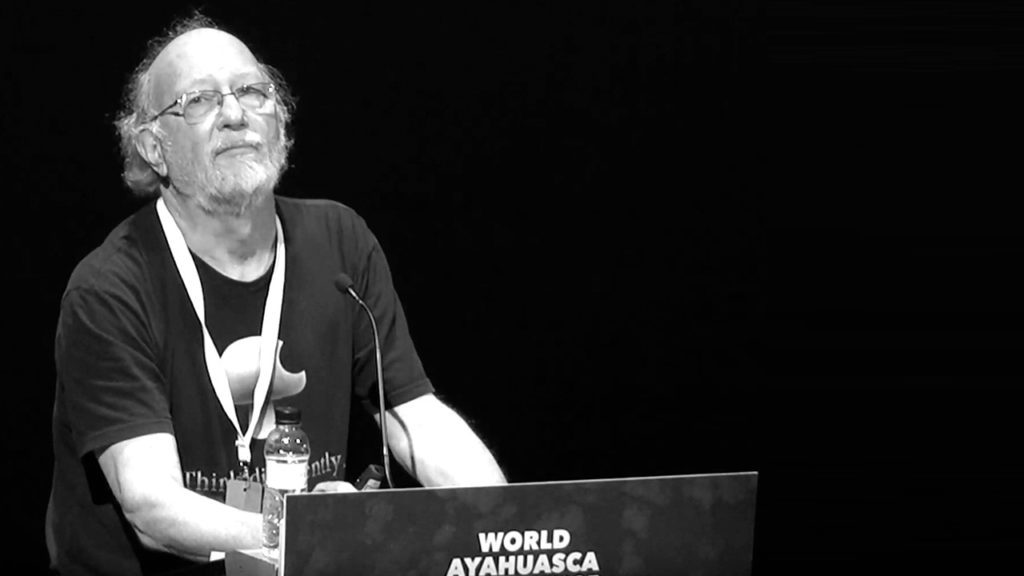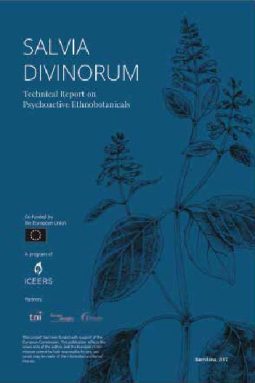Dennis McKenna is a world-renowned ethnobotanist and public speaker, co-founder of the Hefter Institute, and founder of the new organization the McKenna Academy for Natural Philosophy. In his talk at AYA2019, McKenna explored the notion of plant intelligence, describing how plants communicate through chemical messenger molecules, and how hyperconnected networks between organisms are the basis of life on earth. This post is a summary of his talk at the 2019 World Ayahuasca Conference held in Girona, Spain.
Plant intelligence
A few years ago, the idea that plants are intelligent would have fallen onto deaf ears with most people. It’s not an easy concept for many people to wrap their heads around. Yet there is now increasing acknowledgment that plants, in some respects, display a kind of intelligence.
What do we mean by intelligence? The usual definition is the capacity for learning, reasoning, understanding and various forms of mental activity, such as abstract thought. This is an anthropocentric definition. There’s another definition, we could say that intelligence is the ability to respond in optimal ways to the challenges presented by one’s environment and circumstances. This is the definition that we can apply to plants. Plants are masters at adapting themselves to the circumstances they find themselves in, using various mechanisms to do so.
Humans have a lot to learn from plants about adapting. We need to listen harder, better to what the plants are telling us.
It turns out you don’t need a brain to be intelligent. What is required are neural networks, or hyper connected networks, which occur everywhere in nature, not just in neural pathways and often brains are not involved at all. The brain is one of the most complex objects in the known universe and the most studied. All of the brain’s bio-chemical transduction are mediated by the neural communications network.
To quote Salvador Dali, “I do not take drugs, I am drugs.” This is a profound truth. We are biochemical beings. Brain neurotransmitters and plant messenger molecules evolved from the same evolutionary precursors and probably served similar functions. It is therefore not surprising that plants contain a number of neurotransmitter-like compounds that can act on brain transmitters. That’s why when we ingest compounds from plants, interesting things happen.
Photosynthesis and messenger molecules
When Dennis McKenna took huasca for the first time with the UDV in São Paulo, he had his first transformational experience with ayahuasca. He had a profound visionary revelation about photosynthesis, this important process that forms the basis of life itself. It left him concerned about the future of our planet. He then received an important message: “You monkeys only think you’re running the show.” What McKenna took away from this is that the plants are running the show on this planet. Without them, there would not be life on earth. The message was that the plants would not let us destroy the planet.
Photosynthesis is the greatest discovery of all time. Plants are able to capture energy from the sun and use it to make an enormous variety of organic molecules – using sunlight, water, and carbon dioxides. They are chemists and in the process they control the main factors on the biosphere level that makes the earth compatible for life.
“Brains are not needed for intelligence“ ~ Dennis McKenna at #AYA2019 Click To TweetThere are some secondary compounds that are not considered necessary for life and are not found in all plants. They serve as messenger molecules. Plants respond to their environment through chemistry – they can’t run away but can use molecules to mediate their relationships with other organisms in their environment. The main functions are defense, semiosis, and/or symbiosis. The last of these is really interesting – symbiosis is the formation of an alliance between different species for mutual benefits. This is how the biosphere works, a much more important process than competition.
These compounds, therefore, can be thought of as the neurotransmitters of the Gaian mind. The language of plants is chemistry. They use chemistry to communicate and regulate interactions with every organism and ecosystem in the biosphere.
So who needs brains? Brains are not needed for intelligence, perhaps our brains are impediments. What is required are hyper connected systems of communication and feedback. In the forests, the entire ecosystem is regulated by equally complex mychorrhizal networks via signal transductions mediated by plant messenger molecules. The trees and fungi are the internet of the forest.
Gaia Hypothesis
This concept, which is found in the most ancient traditions, speaks to how the Earth is alive and is our Mother. James Lovelock’s Gaia hypothesis speaks to how the entire community of life on earth actively modulates the global ecosystem to keep planetary conditions within relatively narrow limits that are optimal for life.
The earth is alive. There are critical parameters that the earth must actively regulate to keep the earth habitable – temperature, salinity and pH of the oceans; atmospheric composition; and surface temperature. And these are the very parameters that we are messing with in serious ways, potentially destabilizing some of them to the point where they may not recover.
As McKenna stated in an interview on Reality Sandwich, the message of ayahuasca to humanity is a clear one: “‘Wake up!’ Wake up to your relationship to nature. Wake up to the responsibility we all have to care for the planet. And, most importantly, take action.”
Categories:
NEWS
, Others
, Others
, AYACONFERENCE
Tags:
ayahuasca
, psycheplants


